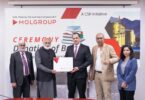KABUL (Agencies): The sixth round of consensus-building meetings for peace in Afghanistan was held with the participation of Foreign Minister Mohammad Haneef Atmar, high-ranking government officials, ambassadors and representatives of Asian and European countries, and Afghanistan’s regional and international partners at the Storai Palace of MoFA.
According to report, at the outset, the Minister of Foreign Affairs briefed the participants about the challenges of the second round of peace talks, Taliban’s regional trips and the group’s failure to live up to its commitments, the Islamic world’s solidarity in condemning war and supporting peace, and the importance of regional and international consensus for the success of the Afghan peace process.
Minister Atmar thanked Afghanistan’s regional and international partners for sharing the Government’s viewpoints and concerns on the Taliban’s non-compliance with their commitments.
Mr. Atmar noted that reducing violence, severing ties with terrorists, advancing sincere and meaningful negotiations, and preventing the released Taliban prisoners from returning to the battlefield were four major commitments that the Taliban failed to fulfill. The Minister of Foreign Affairs also referred to the reports of the Security Council Analytical Support and Sanctions Monitoring Team and other credible international reports in this regard.
Minister Atmar also welcomed the new US administration’s decision to review the Taliban’s compliance with their commitments based on the US-Taliban agreements, calling it an essential step for advancing the Afghan peace process.
Mohammad Qasim Halimi, Minister of Hajj and Endowments, discussed the formation of a broad consensus in the Islamic world for ending bloodshed and realizing peace in Afghanistan. Minister Halimi added that Islamic countries, reputable institutions, and organizations (like OIC & MWL), well-known personalities and Muftis of the Islamic world (like Sheikh Qarzawi) have consistently disapproved of the war in Afghanistan and have reiterated that attacking schools and universities, destroying infrastructures, and killing innocent civilians were in stark violation of the principles and teachings of the holy religion of Islam.
Mr. Sayed Saadat Mansour Naderi, Minister of State for Peace, and Mr. Mustafa Mastoor, Senior Advisor to the High Council for National Reconciliation, also discussed the progress in the peace process and drew the attention of regional countries and the international community to the challenges facing the second round of peace talks.
Ambassadors and representatives of regional and international countries and organizations, while expressing their deep concern over the escalation of violence and targeted killings of civilians, reiterated their support for the continuation of peace negotiations and advancing the Afghan-led Afghan-owned peace process. They also welcomed and supported the efforts and principled stance of the Afghan Government towards the fulfillment of the commitments by all involved parties, the establishment of a ceasefire, and achieving a comprehensive political solution commensurate with the will of the Afghan people.






